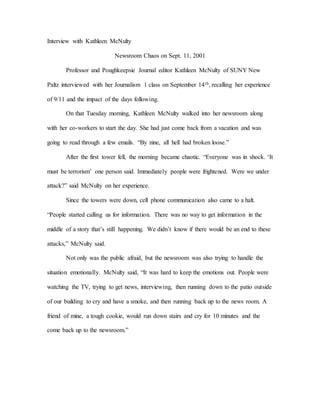Sept 11 interview
- 1. Interview with Kathleen McNulty Newsroom Chaos on Sept. 11, 2001 Professor and Poughkeepsie Journal editor Kathleen McNulty of SUNY New Paltz interviewed with her Journalism 1 class on September 14th, recalling her experience of 9/11 and the impact of the days following. On that Tuesday morning, Kathleen McNulty walked into her newsroom along with her co-workers to start the day. She had just come back from a vacation and was going to read through a few emails. “By nine, all hell had broken loose.” After the first tower fell, the morning became chaotic. “Everyone was in shock. ‘It must be terrorism’ one person said. Immediately people were frightened. Were we under attack?” said McNulty on her experience. Since the towers were down, cell phone communication also came to a halt. “People started calling us for information. There was no way to get information in the middle of a story that’s still happening. We didn’t know if there would be an end to these attacks,” McNulty said. Not only was the public afraid, but the newsroom was also trying to handle the situation emotionally. McNulty said, “It was hard to keep the emotions out. People were watching the TV, trying to get news, interviewing, then running down to the patio outside of our building to cry and have a smoke, and then running back up to the news room. A friend of mine, a tough cookie, would run down stairs and cry for 10 minutes and the come back up to the newsroom.”
- 2. When McNulty interviewed 9/11 survivor and young father at the time of the attack, Tom Canavan, she could sense the strain and depression that would hit him after the event. One year later, she went back to interview him and found he had been suffering from severe PTSD and been put on different medications. “He was very, very traumatized.” The effects also hurt Poughkeepsie Mayor Colette Lafuente, who came by the newsroom the day after the towers were attacked, asking if the Poughkeepsie Journal would run her missing husband’s photographs in hopes to find him after he didn’t come home from the city on the night of September 11th. McNulty recalls Mayor Lafuente’s situation: “It turned out after much investigation, he worked at a bank but had a flyer on his desk for a bank trade breakfasts in the World Trade Center that morning. It took her years to have him declared dead because hundreds of people couldn’t find their families DNA. It is horrible to have to live with that.” McNulty admits it is still hard for her to travel into Manhattan. “It was not the New York you were used to. It didn’t seem like the same place. You never felt it would feel the same ever again…no one could tell you that you were safe.”

